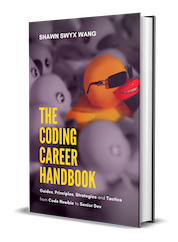
The Coding Career Handbook by Shawn Wang (@swyx)
tl;dr 🔗︎
The Coding Career Handbook is chock full of nuggets for aspiring senior engineers and beyond. It lightly covers a vast number of essential, mostly non-technical topics that senior+ engineers should know, and gives extensive hyperlinks for each.
Many of the career tactics offered are variations of Shawn’s learn in public theme for building a professional network via writing and social media.
Overview 🔗︎
Shawn brings an unusual background to this work, with a successful career in finance prior to rebooting himself into a new career in software development. He looks at the junior-senior trajectory with the perspective of someone who’s already climbed a career ladder and is doing it again. Then he explains to others how to do it.
Who is this book for?
One group is what I call “aspiring” senior engineers. For them, it’s an accelerant, answering the question “what else do you need to know to succeed in this business long term?" It covers a breadth of business and soft-skills topics that people don’t see in their day jobs.
Another group is engineers already in senior+ roles. For them, it’s a refresher, a reference, and a bit of a coach. It may say things they already know, but it says them in inspiring or memorable ways.
I think non-coders and brand new coders will get the least from this book, except in one sense: it’s good to know it exists for the future. For these groups, I think focusing on craft versus career trajectory will have a bigger immediate impact. This book can wait until they’re ready.
The good parts 🔗︎
The book is really, really broad. Imagine if someone sat down and mind mapped every idea that might be useful to know in a coding career and then organized it in an approachable way. And covered 80+% of the important parts. That’s what Shawn did!
Each section offers concise thoughts, and then usually voluminous hyperlinks to some of the best writing on the Internet about that topic. The collection of links alone is incredibly valuable.
One of the unusual topics covered quickly, yet extensively, is the business side of software: technology value chains, adoption curves, business models, etc. and why those are relevant to an engineering career.
Another thing I really appreciated was the repeated, realistic advice about the value of people networks. The book offers a distinctive take on “learning in public” as a way to build this network throughout one’s career – including pushing readers to start writing/creating earlier than they might think, and specific tactics for doing this successfully. There’s really fresh thinking here and ideas I’ll be pondering for a while.
The bad parts 🔗︎
Given Shawn’s limited professional coding experience, it draws heavily from his personal trajectory and the particular interests and companies he’s been exposed to. It’s missing broader, lived experience and some “hey, I’ve seen this done a couple ways” perspectives (though the links he gives help fill in some pieces).
As a result, I found it comes across very biased towards a particular model of coding career success, specifically, one that is very social-media and open-source driven.
This might be a challenge for some because free time is a privilege.
Inexperienced readers might get discouraged if they think that “internet famous” is the model for a successful career and it doesn’t fit their life or personality.
The sections for junior engineers are relatively light in content and links compared to other sections. The book skims or omits a lot of tactical concepts that new engineers need to master. Many things I would have expected – such as code review, agile development, readability, git techniques, etc. – are mentioned in passing or not at all, or mentioned as if the reader already knows what they are.
The mixed parts 🔗︎
The structure of the book reads like a collection of blog posts. (Some of it was adapted from them.) The sections are mostly small and punchy instead of deep, leaning heavily on the hyperlinks for depth. This is either a feature or a bug, depending on your preferences.
Because there are so many ideas crammed in, it may be over the head or overwhelming to someone in the early part of their career. Sections of the book are informational or though-provoking, but not necessarily actionable. On the other hand, that makes it evergreen as people can keep going back to it and finding something new each time.
Summary 🔗︎
This book is all about cramming years of discovery and perspective broadening into a single resource. It’s a great example of the 80:20 principle in action. It may not cover everything, but it pulls together some of the very best thinking on a huge number of essential topics.
If you’re looking for an accelerated course of study for a successful coding career, The Coding Career Handbook offers a comprehensive road map and a lot of good advice.